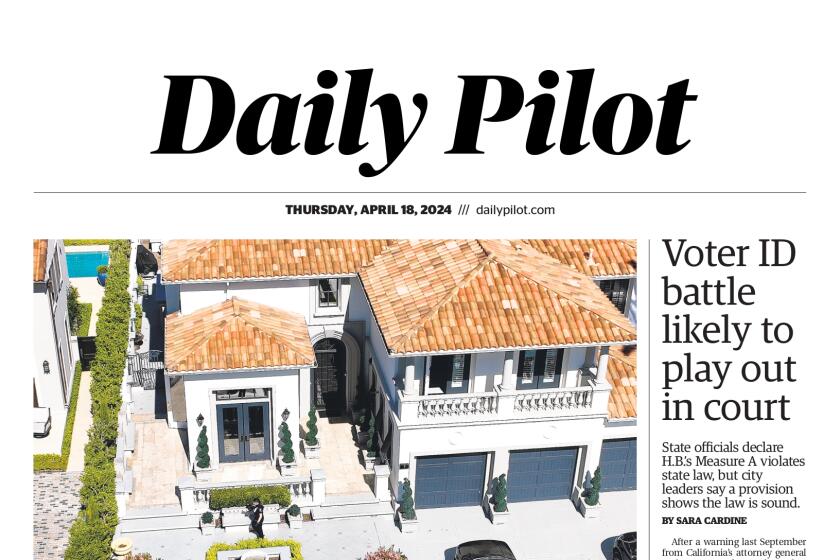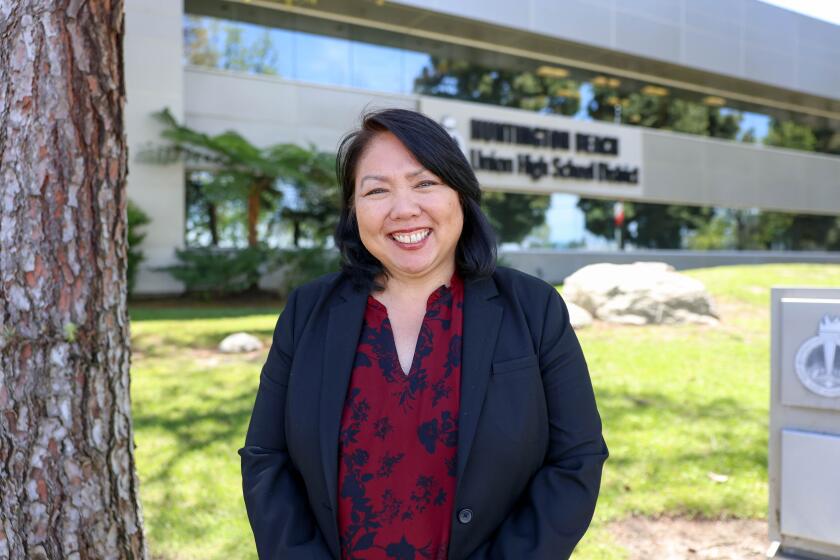Judge grants class-action status in lawsuit accusing Laguna Beach of discriminating against disabled homeless people
A U.S. District Court judge in Santa Ana issued multiple rulings in the past week in connection with a 2015 lawsuit filed by the American Civil Liberties Union Foundation of Southern California, which alleges the city of Laguna Beach discriminates against disabled homeless people.
In court documents filed Friday and provided by Laguna Beach City Attorney Phil Kohn on Tuesday, Judge Andrew Guilford granted a motion for class-action status from David Sestini, Michael Newman and Richard Owens, who documents say represent “all homeless persons who reside or will reside in Laguna Beach who have a mental and/or physical disability” as defined under the federal Rehabilitation Act and Americans With Disabilities Act and “who have been, or are likely to be, cited for violations” of state and/or city laws.
The 2015 lawsuit challenges the city’s practice of issuing citations for sleeping or lodging in public to disabled homeless people who cannot access the local emergency shelter, known as ASL.
ASL, which stands for Alternative Sleeping Location, is an emergency overnight shelter in Laguna Canyon that provides 45 beds, meals, laundry, showers and van service to Laguna’s bus depot. Officials from the Laguna Beach-based nonprofit Friendship Shelter operate the ASL under contract with the city.
Sestini, Newman and Owens allege the city violated protections against cruel and unusual punishment under the eighth and 14th amendments of the U.S. Constitution, Title II of the Americans With Disabilities Act and Section 504 of the Rehabilitation Act, according to court records.
“The lawsuit will have a broader impact with the representative class rather than a few individuals,” Eve Garrow, homelessness policy analyst for the ACLU, said in an interview when asked to explain the reason for the class-action motion.
Guilford denied the men’s motion for summary judgment, or ruling without trial, on the allegations of violations of the ADA and Rehabilitation Act.
“There are genuine issues of material facts about whether plaintiffs were excluded from, discriminated against or denied benefits from the ASL by reason of their disabilities,” Guilford wrote. “And there are genuine issues of material facts about whether modifications to the ASL are necessary to avoid discrimination on the basis of disability.”
However, Guilford granted the plaintiffs’ motion for summary judgment regarding a claim that city staff members transport people to and from the ASL using a van that is not equipped with ramps or lifts. The city does not dispute that, according to court records.
Guilford affirmed the city’s request for summary judgment on the plaintiffs’ due-process claims, according to court records.
Kohn wrote in an email that he had no comment and would discuss the case with the City Council during its closed session Tuesday evening.
Plaintiffs seeking class-action status must satisfy four elements of federal law, according to Guilford’s ruling. One element requires claims to be typical of the claims of the class members.
“It is true that proposed class members suffer from a wide variety of mental or physical disabilities, but the overarching issue for each member is identical,” Guilford wrote in his ruling. “All are allegedly adversely affected by defendants’ homelessness policy.
“Proposed class members, according to defendants, each allegedly experienced different harms. For example, one individual was allegedly harmed physically from having to sleep on the ASL’s floor mats, while another individual suffered from anxiety allegedly exacerbated by conditions at the ASL.
“Proposed class members all allegedly suffered the injury of having their rights violated due to their disabilities,” Guilford wrote.
Plaintiffs claim there are about 80 applicable homeless people, according to court records. The city disputes that number, claiming it is based on 2009 data and is not current, according to court documents.
A pretrial conference is scheduled for July 17. Trial is scheduled to start Aug. 1, Kohn said.
Twitter: @AldertonBryce
All the latest on Orange County from Orange County.
Get our free TimesOC newsletter.
You may occasionally receive promotional content from the Daily Pilot.




